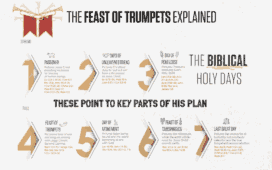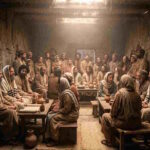Holy Days: Trumpets cgg.org
Church members approach various biblical festivals with different moods. Passover and Unleavened Bread invoke somber reflection, emphasizing the sacrifice of God and His Son compared to our imperfection. Pentecost brings a sense of excitement as we consider the arrival of the Holy Spirit to guide us. The Feast of Trumpets, however, is characterized by exuberance as we anticipate Christ’s return and our glorious resurrection. Nevertheless, this festive mood shouldn’t overshadow its sobering message—a warning of impending judgment upon the world.
“Feast of Trumpets” derives from Leviticus 23:23-25, emphasizing the “blowing of trumpets.”
Trumpets symbolize warning cries in Scripture (Isaiah 58:1, Jeremiah 4:5, Ezekiel 33:3, etc.), foretelling a day of darkness and judgment.
These warnings are not just for the world but also for God’s people, particularly those living in the end times, urging spiritual preparation through repentance, fasting, and prayer.
The Feast of Trumpets signifies the Day of the Lord’s arrival, as outlined in Revelation 8-9 and 1 Corinthians 15:52.
God’s wrath upon humanity is motivated by love, aiming to bring about repentance and His Kingdom.
The Church plays a vital role in preparing as a worthy bride for Christ (2 Peter 3:10-18, Revelation 19:7-9).
The Feast of Trumpets represents the mystery of becoming immortal and incorruptible spirit beings at Christ’s return (1 Corinthians 15:50-58, 1 John 3:2).
Christ’s return marks the beginning of God’s reign, with opportunities for all to enter His Kingdom during the Feast of Tabernacles and the Last Great Day.
While the Feast of Trumpets symbolizes Christ’s return, it doesn’t specify the exact date, but the church remains prepared.
Being ready for Christ’s return by loving one another fervently is crucial (Matthew 25:31-46). This readiness enables us to help others during the challenging times preceding God’s Kingdom.
Report Story




